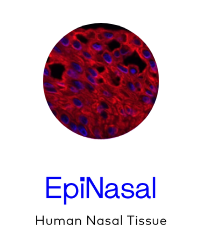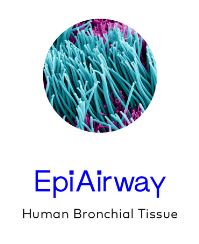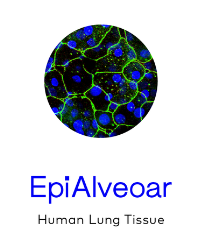MatTek’s 3D Respiratory Tissue System for Drug Delivery
MatTek is the top provider of in vitro 3D respiratory tissue models for drug testing. We offer three primary human respiratory tissue models: EpiNasal, EpiAirway, and EpiAlveolar. These models provide researchers with a comprehensive understanding of the physiological effects of pharmaceuticals, chemicals, pathogens, and consumer products on the human respiratory system. 
EpiNasal, our newest 3D respiratory tissue model, is made from primary human nasal epithelial cells. It mimics the 3D structure and function of nasal epithelium with mucus-producing goblet cells, functional tight junctions, and beating cilia.
EpiAirway, the first 3D respiratory model produced by MatTek, is a human trachea/ bronchial tissue. It consists of highly differentiated primary tracheal/ bronchial epithelial cells, mucus-producing goblet cells, functional tight junctions, and beating cilia. Also offered as a full-thickness model, EpiAirwayFT, includes a layer of normal human stromal fibroblasts crucial in tissue repair and wound healing.
EpiAlveolar, our 3D co-culture respiratory model, offers an air-blood barrier. Grown from primary human alveolar epithelial cells, pulmonary endothelial cells, and fibroblasts the model mimics the function and structure of in vivo human alveolar tissue.
Recent studies have demonstrated the utility of EpiNasal, EpiAirway, and EpiAlveolar in drug testing for emerging infectious diseases. EpiNasal and EpiAirway were used to evaluate the antiviral activity of two novel compounds, Remdesivir and EIDD-1931, against several strains of SAR-CoV-2. EpiAirway and EpiAlveolar were used to screen a variety of current market drugs for antiviral activity against SARS-CoV-2 variants Delta and Omnicron.
Further studies included utilizing EpiAlveolar to characterize the expression and activity of Organic Cation Transporters and their interactions with anticholinergic drugs. In this study, EpiAlveolar was found to be similar to EpiAirway and could be useful for screening biopharmaceuticals. These studies in addition to our library of technical references demonstrate the effectiveness of our respiratory models for drug screening and development.
Opportunities to Connect
Will you be in Gothenburg, Sweden May 3rd to 5th at The Advanced Inhalation Toxicology Conference? Reach out to Miroslav to connect!
Register Now


